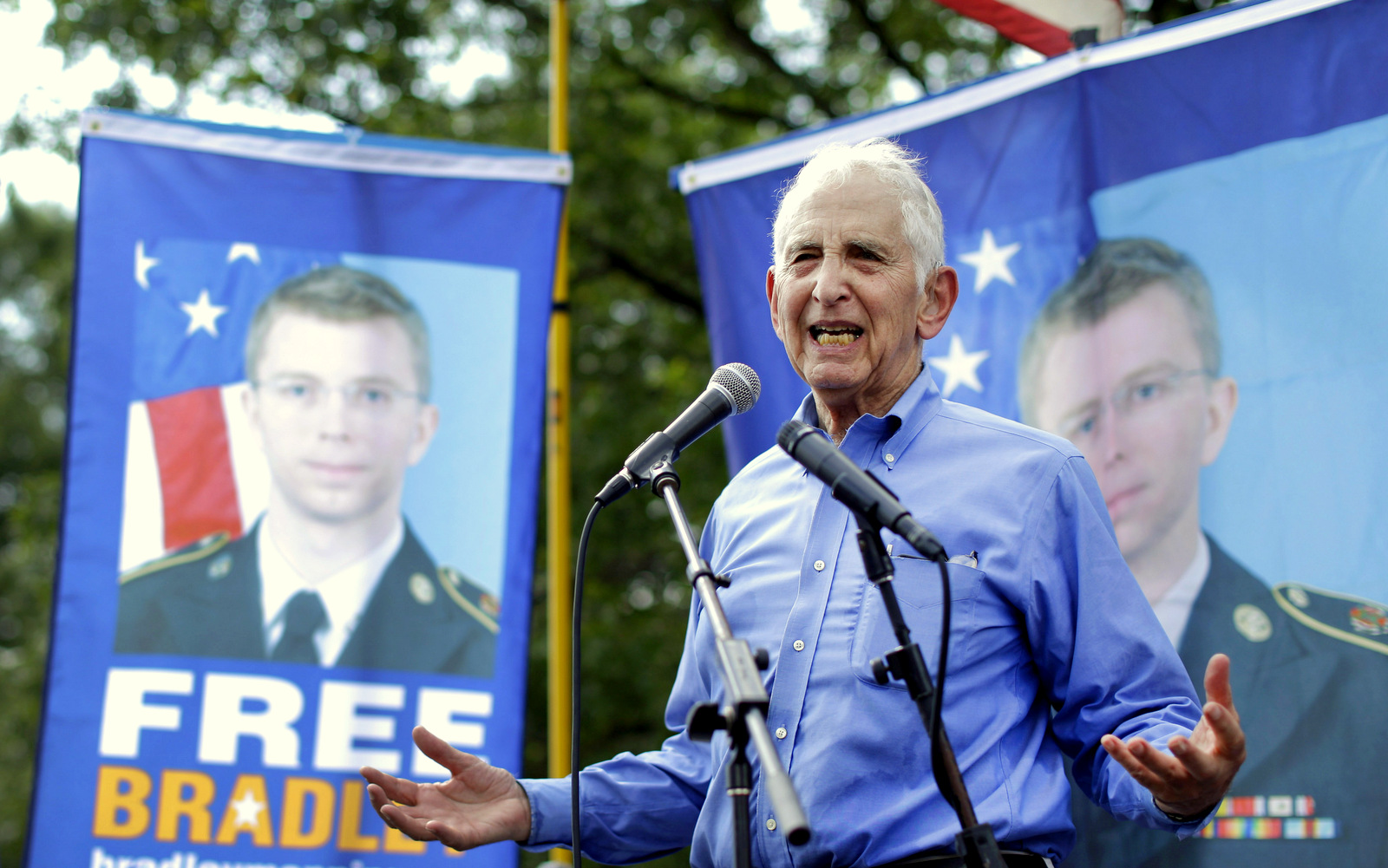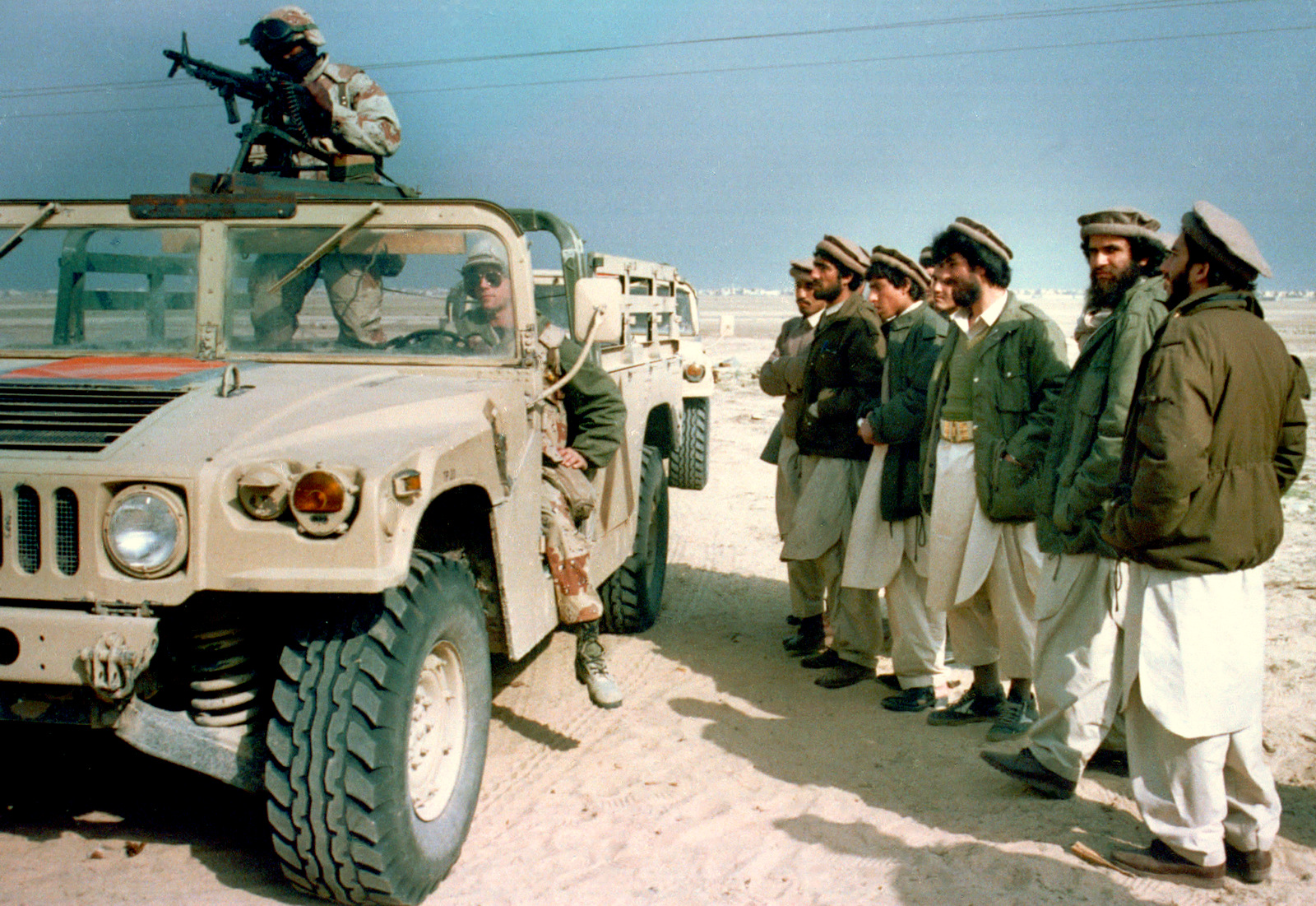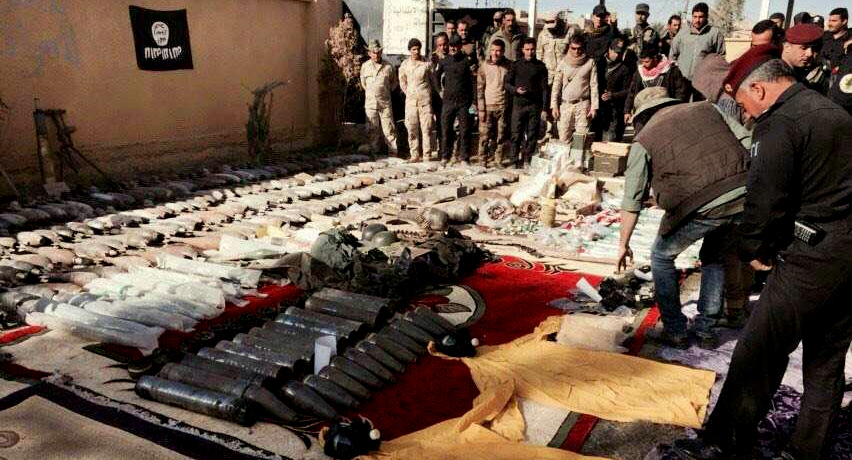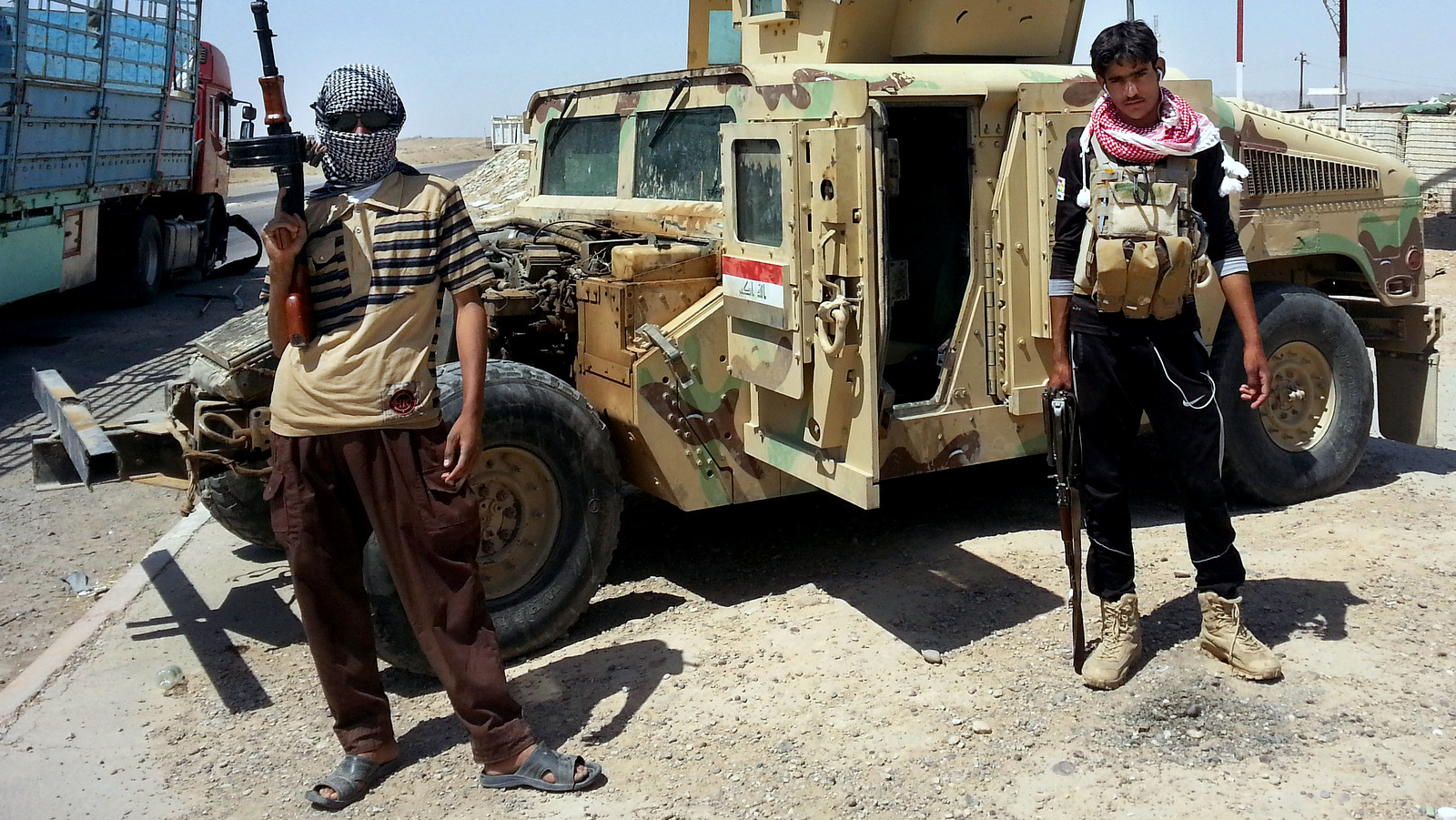Are US Academics Who Cite "WikiLeaks" Blackballed?
Hersh's Latest Bombshell: U.S. Military Undermined Obama on Syria with Tacit Help to Assad
"It is very difficult for the prosperous to be humble.” — Emma (1815)
"I do not want people to be very agreeable, as it saves me the trouble of liking them a great deal.” — Personal correspondence of Jane Austen
"Vanity working on a weak head, produces every sort of mischief.” — Emma (1815)
"The more I see of the world, the more am I dissatisfied with it; and every day confirms my belief of the inconsistency of all human characters, and of the little dependence that can be placed on the appearance of merit or sense.” — Pride and Prejudice (1813)
I always thought when I first began hearing the shallow, uneducated or unprepared (or both) second-rate
PNAC*'ers - the Wolfowitzes, Feiths, Libbys, Boltons, Kagans, Perles, Carluccis, Pipes, Podhoretzes, Weyrichs, Woolseys, Cohens, Krauthammers, Zakheims, Bennetts, Bauers (not to mention the stolid Kristols, Abramses, Armitages, Weinbergers, Rumsfelds, Cheneys and Bushes) of the
inner political world talk about going nuclear if pushed, that they were only doing so in order to impress their friends** because they had exclusive insider knowledge about what the stealthy inner circle was planning as their last resort of maintaining power.
Or maybe not even the last.
Daniel Ellsberg seems to agree.
In Part II of a 13-part discussion hosted by "MintPress News," the Pentagon Papers whistleblower tells social justice activist Arn Menconi that the CIA exists to protect the president from being held accountable for the government’s secret foreign policy.
December 21, 2015

In this Saturday, June 1, 2013 file photo, Daniel Ellsberg, the whistleblower responsible for releasing the Pentagon Papers, speaks during a rally in support of Army Pfc. Chelsea Manning, formerly Bradley Manning, outside the gates of Fort Meade, Md. on Wednesday, Aug. 21, 2013. (AP Photo/Patrick Semansky)
MINNEAPOLIS — "MintPress News" is proud to host “Lied to Death,” a 13-part audio conversation between famed whistleblower Daniel Ellsberg and social justice activist Arn Menconi.
Menconi wrote that these interviews are a “mixture of historical, political science and Dan’s sixty-year scholarly analysis as a former nuclear planner for Rand Corporation.”
For more information on the interview and Daniel Ellsberg, see the introduction to this series.
Chapter 1: Ellsberg on the the origins of empire and the nuclear danger to humanity
In the first full chapter of “Lied to Death,” Ellsberg discusses the origins of American empire, telling Menconi that empire building goes all the way back to Sargon, the ruler of ancient Mesopotamia and history’s first emperor.
However, unlike the emperors of old, the U.S. government publicly espouses democracy while simultaneously carrying out many of the same forms of repression and manipulation that historic rulers used to gain global power, he says.
For Ellsberg, that’s where the CIA and similar forces become essential. While he believes that covert actions may be necessary for any nation to protect itself during times of war, Ellsberg tells Menconi that only an empire needs covert agencies during times of peace because those agencies help maintain the image of freedom and transparency.
“The United States is not a government with a covert operations agency named the CIA, it’s a government which has a covert foreign policy,” Ellsberg explains.
Ellsberg argues that the CIA allows the U.S. to enact this covert foreign policy, which is not meant to ensure the independence of other nations, but to “buy their dependence.” When something goes wrong, the agency protects the White House from accountability. Even when the government’s cover story for its actions is revealed to be false by the media or a whistleblower, he says “there are other cover stories and cover stories within cover stories” — all of which misdirect attention. “The president is not held accountable … and he will not be held [accountable] before history.”
Apart from the pretense of democracy, Ellsberg argues that the United States is “unremarkable” as an empire, except for a few key points, most notably its ability to use the threat of nuclear weapons.
“The danger of all-out war leading to the extinction of the human species is significant right now and always has been larger than people thought,” he tells Menconi.
He does not believe that government officials actively seek out nuclear war, understanding that it would be devastating for humanity. But Ellsberg claims the U.S. has used the threat of nuclear conflict far more frequently than the public realizes, and that government leaders consider the potential for actual nuclear war to be an “acceptable risk” in return for the power the threat confers over other nations.
The U.S. and a handful of its allies, including the United Kingdom and France, also act as nuclear kingmakers, choosing which countries will be allowed to have nuclear weapons and which will not.
Unfortunately, this behavior has brought us closer to human extinction by promoting a global buildup of nuclear weapons which could be deployed at any time. Specifically, Ellsberg says U.S. foreign policy is directly responsible for the buildup of Russian nuclear weapons during the Cold War.
As sites like "WikiLeaks" and figures such as Edward Snowden continue to reveal uncomfortable truths about America’s endless wars for power and oil, one important figure stands apart as an inspiration to the whistleblowers of today: Daniel Ellsberg, the whistleblower who leaked the “Pentagon Papers,” over 7,000 pages of top secret documents, in 1971.
A military veteran, Ellsberg began his career as a strategic analyst for the RAND Corporation, a massive U.S.-backed nonprofit, and worked directly for the government helping to craft policies around the potential use of nuclear weapons. In in the 1960s, he faced a crisis of conscience while working for the Department of Defense as an assistant to Assistant Secretary of Defense for International Security Affairs John T. McNaughton, where his primary duty was to find a pretext to escalate the war in Vietnam.
Inspired by the example of anti-war activists and great thinkers like Gandhi and Martin Luther King, Jr., he realized he was willing to risk arrest in order to prevent more war. Lacking the technology of today’s whistleblowers, who can carry gigabytes of data in their pockets, he painstakingly photocopied some 7,000 pages of top secret documents which became the “Pentagon Papers,” first excerpted by "The New York Times" in June 1971.
Ellsberg’s leaks exposed the corruption behind the war in Vietnam and had widespread ramifications for American foreign policy. Henry Kissinger, secretary of state at the time, famously referred to Ellsberg as “the most dangerous man in America.”
Ellsberg remains a sought-after expert on military and world affairs, and an outspoken supporter of whistleblowers from Edward Snowden to Chelsea Manning. In 2011, he told the Chelsea Manning Support Network that Manning was a “hero,” and added:
“I wish I could say that our government has improved its treatment of whistleblowers in the 40 years since the Pentagon Papers. Instead we’re seeing an unprecedented campaign to crack down on public servants who reveal information that Congress and American citizens have a need to know.”
To delve into Daesh’s convoluted money trail, one must first explore its equally convoluted origins. And in both areas, the role of the U.S. and its allies can not be ignored.
ISIS militants stand with a captured American Humvee, given to the Iraqi Army and captured by ISIS, June 19, 2014. (AP Photo)
KITCHENER, Ontario — Out of nowhere, it seems, Daesh, also commonly referred to as ISIL or ISIS, spontaneously formed, a group that perverts aspects of Islam for its own violent ends, and threatens, we are told, all that the civilized world holds dear.
The “war on terror,” governments inform their citizens, has a new front. And that front is Daesh.
Let us not be too hasty. Things are not always what they appear. Daesh is well-financed, and that money must be coming from somewhere other than a ragtag band of malcontents. Daesh soldiers have advanced weaponry and sophisticated communications methods. They have tanks and Humvees. None of these can be obtained without significant funding. Though the source is quite illusive, there is some evidence that will lead to a trail.
First, we must look at Daesh’s origins, and even that is not easily discernable. Writing for "The Guardian" in August 2014, Ali Khedery suggests:
“Principally, Isis is the product of a genocide that continued unabated as the world stood back and watched. It is the illegitimate child born of pure hate and pure fear – the result of 200,000 murdered Syrians and of millions more displaced and divorced from their hopes and dreams. Isis’s rise is also a reminder of how Bashar al-Assad’s Machiavellian embrace of al-Qaida would come back to haunt him.
Facing Assad’s army and intelligence services, Lebanon’s Hezbollah, Iraq’s Shia Islamist militias and their grand patron, Iran’s Revolutionary Guards, Syria’s initially peaceful protesters quickly became disenchanted, disillusioned and disenfranchised – and then radicalised and violently militant.”
It is interesting that Mr. Khedery says that Assad’s “embrace of al-Qaida” came back to haunt him. It brings to mind a parallel situation in the United States. (Actually, there are many, but we will look at only one.)
Examining the Theories of the Origins of Daesh

A group of Afghan mujahedeens, Islamic guerrillas, look over a U.S. Marine humvee in eastern Saudi Arabia, Monday, Feb. 11, 1991. The Marines visited a camp consisting of about 300 mujahedeens who have been asked by the Saudi government to help fight against Iraq in the Gulf War. (AP Photo/Department of Defense)
In the early 1960s, when the U.S.-supported leadership of Iraq was becoming just a bit too big for its britches — at least in the United States’ view — in wanting to challenge Israel as a major player in the Middle East, the U.S. decided that its leader, Abdel Karim Kassem, had to go.
Selecting a virulent anti-communist party to throw its support to, the U.S. worked closely with a young man named Saddam Hussein. We all know how well that ultimately worked out. The source of much, but not all, of the unrest in the Middle East today can be traced back to that U.S. decision.
Other theories on the formation of Daesh are also worth considering. Yasmina Haifi, a senior employee of the Dutch Justice Ministry’s National Cyber Security Center, asserted that Daesh was created by Zionists seeking to give Islam a bad reputation. “ISIS has nothing to do with Islam. It’s part of a plan by Zionists who are deliberately trying to blacken Islam’s name,” she wrote on Twitter in August 2014.
And finally, it has been more than suggested that Daesh “is made-in-the-USA, an instrument of terror designed to divide and conquer the oil-rich Middle East and to counter Iran’s growing influence in the region,,” as Garikai Chengu, a research scholar at Harvard University, put it in September 2014.
Yet if the United States’ role wasn’t that blatant, it certainly existed, according to Seumas Milne, a columnist and associate editor at "The Guardian." He argued in a June opinion piece:
“[T]he U.S. and its allies weren’t only supporting and arming an opposition they knew to be dominated by extreme sectarian groups; they were prepared to countenance the creation of some sort of ‘Islamic state’ – despite the ‘grave danger’ to Iraq’s unity – as a Sunni buffer to weaken Syria.”
No matter how one looks at it, there are many possible causes that spawned Daesh. As we look at its funding sources, it may all become clearer.
Funding and Materiel, Courtesy of Uncle Sam and His Friends

Iraqi security forces look at confiscated ISIS weapons and ammunition after regaining control over the last week, in Ramadi, Iraq’s Anbar province, 70 miles (115 kilometers) west of Baghdad, Thursday, Dec. 10, 2015. (AP Photo)
In Daesh’s role as opposing Syria (just one of its many roles) the terrorist outfit is believed to have received funding from Saudi Arabia, Kuwait, Qatar and the United Arab Emirates, as part of their opposition to the Assad regime.
But it also generates its own income, having taken control of local businesses, taxing others, and selling oil. Among its customers, incredibly, is Syria. Since Daesh controls much of the oil-production infrastructure in the country, Syria has little choice but to purchase oil from the very group that seeks to overthrow its government.
Reports also indicate that Israel is a main buyer of Daesh oil. The sale is not direct; oil is smuggled by Kurdish and Turkish smugglers, and then Turkish and Israeli negotiators determine the price.
As a result of these oil sales, Daesh has annual revenues estimated at $500 million, according to data compiled by the U.S. Treasury.
In November of this year, Russian President Vladimir Putin claimed that Daesh is being financed by at least 40 countries — including G20 members. With such widespread financing, it will be difficult to defeat Deash.
The U.S., in its misguided and destructive foreign policy toward the Middle East (its misguided and destructive foreign policies toward the rest of the world are topics for a separate discussion), also provided Daesh with a vast arsenal.
Last year, the Department of Defense, bragging about advances against this new “enemy” in Iraq, issued a press release: “The three strikes destroyed three ISIL armed vehicles, and ISIL vehicle-mounted anti-aircraft artillery gun, an ISIL checkpoint and an IED emplacement.” Commenting on that statement in "Alternet," Alex Kane wrote:
“
What went unmentioned by the Pentagon is that those armed vehicles and artillery guns they bombed were likely paid for with American tax dollars. The arms ISIS possesses are another grim form of blowback from the American invasion of the country (Iraq) in 2003.
It’s similar to how U.S. intervention in Libya, which overthrew the dictator Muammar Gaddafi but also destabilized the country, let to a flood of arms to militants in Mali, where France and the U.S. waged war in 2013.”
The U.S. left untold amounts of weaponry in Iraq, and as that country descended into civil war following the United States’ odd salvation of it, that weaponry was free for the taking.
So even if, as suggested above, the U.S. didn’t give birth to Daesh, it has certainly nourished it.
A Merry-Go-Round That Never Stops Spinning
It is interesting to note that U.S. taxpayers are spending $615,482 every hour to fight a “war” in which the “enemy” is being well-financed by countries with whom the U.S. has full diplomatic relations.
Does this not make it appear that “victory” over this enemy is not the goal? With many countries financing and supplying Daesh, might the world’s largest supplier of weaponry, the U.S., not be too interested in losing such a lucrative market? It’s worth noting that the United States’ “foreign military sales rose to a record high of $46.6 billion for fiscal 2015.” With such a healthy cash cow, would the country’s power-brokers really want to end war? Why kill the goose that is laying such pretty golden eggs?
As the U.S. and its hapless allies continue this “war on terror,” an ill-defined and nebulous “enemy” if ever there was one, Syria and Yemen seem to be bearing the brunt of the violence. As in every modern war at least since World War I, innocent men, women and children are the most frequent victims, suffering unspeakably and dying horrible deaths. And, somehow, the world’s most powerful military machine, owned and operated by the U.S., is unable to defeat Daesh.
It must, therefore, continue to arm its allies, which are arming Daesh. So the U.S. provides funding to countries to fight Deash; some of those countries transfer money and armaments to Daesh, who(m) the U.S. is bombing. And it seems that this deadly merry-go-round will continue its endless spinning.
And why should it? The U.S. can, with ever-decreasing credibility, pretend to stand as a beacon of freedom and liberty, arming revolutionaries and destabilizing governments that displease it, while arming allies of the country in revolution, which in turn assist that country. So this “war on terror” never ends, and neither do the abundant profits from war-making.
And when possession of the moral high ground is just an illusion, when rhetoric spewed from the mouths of hypocritical politicians to get the citizenry to wrap themselves in the flag and shed a tear for apple pie, motherhood and Old Glory, and when the almighty dollar is always the bottom line, nothing is going to change.
_ _ _ _ _ _ _
* PNAC recognized that the American public was not eager about massive military pork-barrel spending on defense contracts. Americans were looking forward to a "peace dividend" after 45 years of Cold War spending. So PNAC concluded that Americans MUST experience a crisis, a "New Pearl Harbor" attack, if PNAC expected their vision of massive war and military spending to come to fruition.
In 1998 "The Project for the New American Century" letter (PNAC Letter) was sent to President Bill Clinton. The letter urged Clinton to target the removal of Saddam Hussein's regime from power in Iraq due to erosion of the Gulf War Coalition's containment policy and the resulting possibility that Iraq might develop weapons of mass destruction. PNAC wrote many editorials and letters urging the White House to attack Iraq. PNAC was relentless, and well paid. PNAC was founded with donations from the Bradley Foundation, which funded AEI and other groups.
The most famous PNAC document (which contains the quote about the need for a New Pearl Harbor) is an ambitious 90-page study packed with detailed suggestions on transforming the military, increased spending across the board, what to change with the Navy, Army, Air Force, and militarization of Space. Full Spectrum Dominance. This plan was called Rebuilding America's Defenses.
** Our battle with Kristol and his politics became up-close and personal. During the Free Speech Movement, we continually tripped over his ideological soul mates, sociologists Nathan Glazer and Seymour Martin Lipset, who red-baited us and actively worked with university president Clark Kerr to try to split our ranks. When a very disgruntled Lipset left for Harvard, I very publicly - and most unkindly - hailed his departure as one of FSM's major contributions.
Kristol himself remained an even more enticing target. My comrades and I struggled against his acolytes in SDS. We slammed his increasingly conservative writing in "Commentary." We read and rebuffed his new magazine, "The Public Interest," which he co-founded with Daniel Bell, author of The End of Ideology," a paean to precisely the technocratic thinking we had fought against at Berkeley. We then felt vindicated when "Ramparts" revealed that the Central Intelligence Agency (CIA) had founded, funded, and run the Congress for Cultural Freedom, including "Encounter," its flagship propaganda sheet. Irving Kristol had made his peace with the empire early on, and had gotten a paycheck for doing it.
We fought him, but we never won. Kristol became one of the country's most influential public intellectuals and a favorite of Ronald Reagan. As the neo-con journalist Irwin Stelzer tells it, "Reagan joked at a dinner that anyone wanting a job in his new administration should call the White House and say: 'Irving sent me.' No further vetting would be required." It seemed to work, as Irving's friends helped create Iran-Contra and swallowed hard as Reagan worked to bring detente with Mikhail Gorbachev and the Soviet Union.
Irving's greatest victory was still to come in the charmed political career of his son, William Kristol. Boasting little more than a Ph.D. in government from Harvard and a well-placed daddy, young Kristol served as chief of staff to Reagan's highly ideological education secretary William Bennett and to Vice President Dan Quayle, whose missing brain he became.
Once the Democrats returned to power, William Kristol led conservatives in killing Clinton's health care proposal. He created the leading neo-con newsmagazine, "The Weekly Standard," getting funding from Rupert Murdoch. Then in 1997, he joined with historian Robert Kagan to create the Project for the New American Century (PNAC), Washington's most vocal promoter of going to war against Iraq's Saddam Hussein and those non-existent weapons of mass destruction.
For me, as for most progressives, this was clearly the dragon we needed to slay. But having fought these guys too long, I failed to give sufficient attention to four elements of the story that could now prove crucial.
First, I misunderstood the role of the neo-cons, as did many other writers. While 10 of the 25 people who signed PNAC's founding statement went on to serve under George W. Bush, only two of them had real power, Vice-President Dick Cheney and Secretary of Defense Donald Rumsfeld. Corporate CEOs in oil services, pharmaceuticals, and defense, they were consummate Washington insiders and old-fashioned right-wing nationalists. Along with Bush, they were the imperial potentates, the deciders who set policy on Iraq and other possible targets of regime change. None of the three were neo-cons.
The other eight PNAC signers, neo-cons like Cheney's man Scooter Libby and Rumsfeld's deputy secretary of defense Paul Wolfowitz, were underlings, subordinates, and advisors. They were the handmaidens of empire, the B-list.
Second, while most neo-cons were Jewish and Zionist, Kristol and Kagan were far more committed to American than to Israeli power. Their goal was "to promote American global leadership," and a "benevolent global hegemony," as they called it in a 1996 article in "Foreign Affairs." We should never excuse Israel and its lobbies all over the world for constantly beating the drums of war. But just because the co*k crows before sunrise, it does not mean that he causes the sun to rise.
Third, Kristol and Kagan's message had its roots the Cold War liberalism of Truman and Kennedy, and was far more activist and interventionist than the historic Republican stance, with its lingering pockets of isolationism. Despite Kristol and Kagan's effort to package their world view as a "Neo-Reaganite Foreign Policy," they were far closer to what we now hear from Hillary Clinton.
Fourth, and most important, Kristol and Kagan provided American weapons makers with a perfect substitute for the old Soviet threat. What better marketing strategy for the military-industrial complex than an endless war against Islamic terrorists, Iran, and ultimately China? PNAC laid much of this out in "Rebuilding America's Defenses: Strategies, Forces, and Resources for a New Century," a report written primarily by the group's deputy executive director, Thomas Donnelly, who went on to work for the defense giant Lockheed Martin. PNAC also worked closely with and received major funding from the Bradley Foundation, a strong backer of the defense industry.
Rethinking the neo-cons and liberal interventionists in these ways will help us sharpen our opposition to both. This becomes crucial as Kristol and Kagan's new flagship, the "Foreign Policy Initiative," and "The Weekly Standard" have spent the last two years trying to talk Americans out of being weary with war. I won't be surprised to hear Hillary Clinton join in soon, rallying us to show new spirit in defending American values.
It's true.
American
values must be defended.
At the cost of millions of innocent lives.
And billions for the defense industry.
USA! USA! USA!
(It's almost nice to finally be shown why we can't have national health care or any other benefits for the poor and middle class now and in the future, isn't it?)
Almost.











































